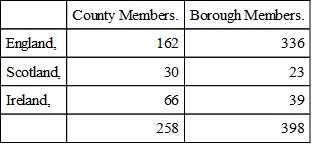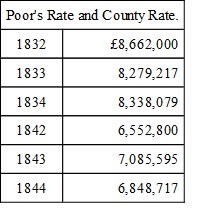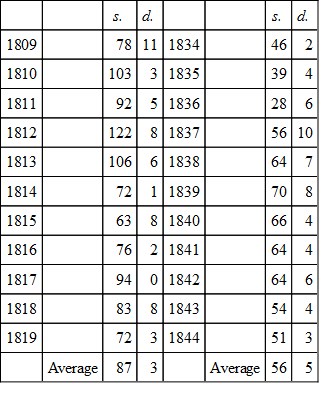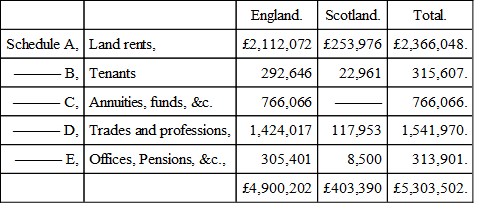
Blackwood's Edinburgh Magazine - Volume 61, No. 376, February, 1847
2
See an eloquent but brief sketch, of W. Smith, in the Law Magazine for February 1846, by Mr. Phillimore, of the Oxford Circuit, one of his most accomplished friends.
3
Lib. vi. proëm.
4
Pers. Sat. ii. 73, 74.
5
The leading Counsel for the plaintiffs was the present Vice-Chancellor Knight Bruce; for the defendants the present Vice-Chancellor Wigram.
6
In one vol. 8vo, pp. 386, Benning & Co. Fleet Street, accompanied by Notes by Jelinger C. Symons, Esq. Barrister-at-Law.
7
But not that of Scotland. Bell's Princip. Law of Scotland, p. 4, (4th Edition.)
8
Pp. 88-96.
9
To this gentleman he dedicated, in 1843, the third edition of his "Mercantile Law." Within a very few months of each other, both of them died—Mr. Richards himself having, as he once told me, ruined his health by his intense and laborious prosecution of his profession. He had found it necessary to retire a year or two before his death. His brother, also, Mr. Griffith Richards, Q.C., one of the ablest members of the Chancery Bar, recently died under similar circumstances.
10
"Law Magazine," N.S. Vol. lxx. p. 183.
11
His chambers were No. 2, Mitre Court Buildings, to which he had removed from No. 12, King's Bench Walk, about two years before.
12
Memoirs of General Pépé. Written by himself. London, 1846.
13
"The Theatres of Paris. By Charles Hervey." London and Paris, 1846.
14
Doubtless Gardoni was apprehensive of some such deterioration of his voice, for he has just left the Académie, after much opposition on the part of the manager, and has made a highly successful appearance at the Italian opera.
15
Innumerable jests and lampoons circulated at the time of Napoleon's separation from Josephine, and second marriage. Conscious of the unworthy part he acted, the Emperor was greatly galled by them. "The keenest and most remarkable of these," says a German author who was in Paris at the time, "is unquestionably a Chanson Poissarde, of which hundreds of copies have been distributed, and which thousands have got by heart. Its author, in spite of Napoleon's fury, and of the zealous exertions of the police, has not been discovered. Several hundred persons have been arrested for copying or repeating it; but its original source remains unknown." It consists of nine verses, in the vulgar and mutilated French of the Paris halles. A couple of them will give a notion of the sly wit of the whole. They refer, of course, to the Emperor and to his future bride, Maria Louisa of Austria:—
Pour ell' il s'est fait l'aut' jour Pemd'en bel habit d'dimanche, Et des diamants tout autour, Près d' sa figur comm' ça tranche! La p'tite luronne, j'en somm' sûr, Aim' mieux l'présent que l'futur. Ah! comm' ell' va s'amuser, C' te princess' qui nous arrive! Nous, j'allons boir' et danser, N's enrouer á crier: Vive! Ell, s' ra l'idol' d' la nation, J' l'ons lu dans l'proclamation.16
"Memoirs of the Reign of George the Second; by Horace Walpole." Edited by the late Lord Holland. 3 vols. Colburn: London.
17
"The good Abderites," writes Wieland in his Abderiten, "once got the notion that such a town as Abdera ought no longer to be without its fountain. They would have one in their market place. Accordingly, they procured a celebrated sculptor from Athens to design and execute for them a group of figures representing the god of the ocean, in a car drawn by four sea-horses, surrounded by nymphs, and tritons, and dolphins. The sea-horses and the dolphins were to spout a quantity of water out of their nostrils. But when all was completed, it was found that there was hardly water enough to supply the nose of a single dolphin. So that when the fountain began to play it looked for all the world as if the sea-horses and the dolphins had all taken a miserable cold, and were put to great shame there in the public place by reason of this dropping rheum. As this was too ridiculous for even the Abderites to endure, they removed the whole group into the temple of Neptune; and now, as often as it is shown to a foreigner, the custodian, in the name of the worthy town of Abdera, bitterly laments that so glorious a work of art should have been rendered useless by the parsimony of Nature."
In like manner, our good Brightonians lately got possessed of the notion that their sea-beaten town ought no longer to be without its fountain. They accordingly procured, not an artist from Athens, but a tall iron machine from Birmingham, tall as their houses, and much resembling in form one candlestick put upon another. This they placed in the choicest site their town afforded. Its ugliness was of no importance, as it was to be hidden underneath the graceful and ample flow of water. But when this water-spouting instrument was erected, it was found here too that no water was to be had—no natural and gratuitous supply. And now when the stranger wonders at this tall disfigurement, and inquires into its meaning, he is told how the spirited efforts of the Brightonians to adorn their town have been rendered fruitless by the parsimony of water-companies. Once a week, however, his cicerone will advertise him—once every week and for two hours together—the fountain is let off to the sound of music, and the people are gathered together to see it play—or rather, he might add, to weep—for even at these moments it feels the effect of the same cruel spirit of parsimony.
Our countrymen had better leave fountains alone. The introduction of them into London is nothing but a thoughtless imitation of what can only be a pleasing and natural ornament in a quite different climate. Who cares to see water spirting in the fog of London, in an atmosphere cold and damp, where there is rain enough to drown the fountain, and wind enough to scatter it in the air? Out of the whole twelve months there are scarce twelve days where this bubbling up of water in our city does not look a very discomfortable object.
18

Or as 2 to 3 nearly.
19
Guizot's Essais Sur l'Hist. de France, 475, 476.
20
Porter's Parliamentary Tables, xii. 6.
21

Parl. Paper. Porter, xii. 247.
22
Porter's Parl. Tables, xii. 36.
23
Porter's Parl. Tables, xii. 37, 42; and xi. 275.
24
Lords' Report on Burdens on Real Property, 1846, p. vi.
25
Lords' Report on Burdens on Real Property, 1846, p. 6.
26
Ibid. p. 7.
27
Ibid. 1847, p. 8.
28
Lords' Report, 1847, p. 7.
29
Prices of wheat average, per Winchester quarter, in the years after mentioned, viz.:—

Tooke on Prices, ii. 389, and Lords' Report on Burdens on Real Property, App. No. 26.
30
Net amount of income tax for year ending 5th April, 1845:—

31
Report, p. 9.









